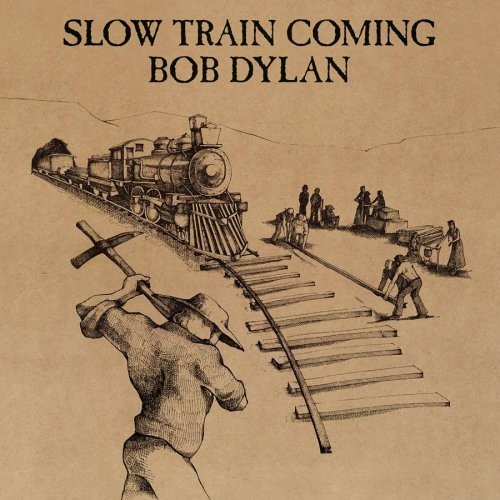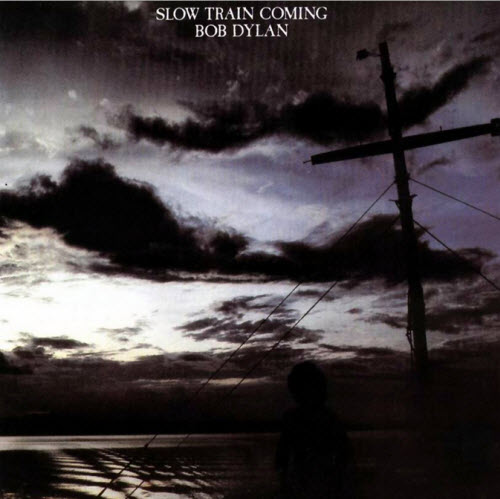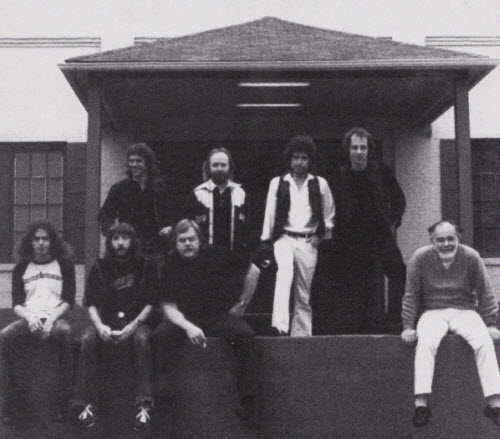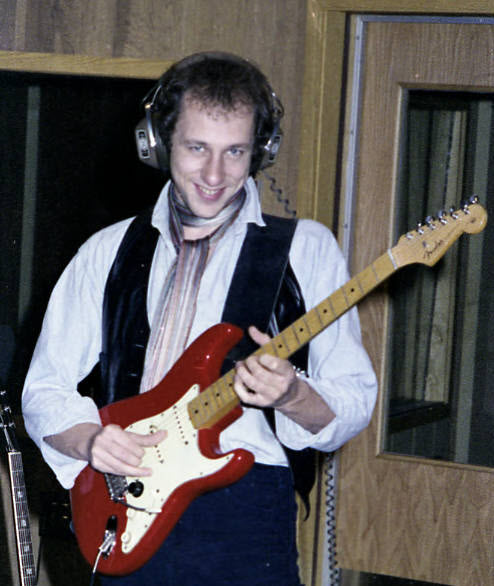
May 2: Bob Dylan 3rd Slow Train Coming Recording Session 1979
It’s in my system. I don’t really have enough time to talk about it. If someone really wants to know, I can explain it to them, but there are other people who can do it just as well. I don’t feel compelled to do it. I was doing a bit of that last year on the stage. I was saying stuff I figured people needed to know. I thought I was giving people an idea of what was behind the songs. I don’t think it’s necessary any more. When I walk around some of the towns we go to, however, I’m totally convinced people need Jesus. Look at the junkies and the winos and the troubled people. It’s all a sickness which can be healed in an instant. The powers that be won’t let that happen. The powers that be say it has to be healed politically.
~Bob Dylan (to Robert Hilburn – Nov 1980)Slow Train Coming was a collection of songs Dylan had originally intended to donate to backing singer Carolyn Dennis.
~Clinton Heylin (The Recording Sessions)
The first 2 recording sessions for “Slow Train Coming” had only resulted one master take for the album – Precious Angel (recorded the previous day).
| On the first recording session on April 30, Dylan tried 8 takes of “Trouble In Mind“. An edited version were released as a single B-side in Sept 1979, and in 2011 Sony released the collection: “Pure Dylan: Intimate Look at Bob Dylan” with “Trouble In Mind” as track 1. A Great song.. album available @ amazon.com.
|
On this 3rd session we got 2 masters for the album: “When You Gonna Wake Up” & “Gonna Change My Way Of Thinking”. We also got “Ye Shall Be Changed” released on “The Bootleg series 1” in 1991.
From wikipedia:
Dylan first heard Mark Knopfler when assistant and engineer Arthur Rosato played him the Dire Straits single, “Sultans of Swing”. Later, on March 29, 1979, Dylan caught the final show of a Dire Straits’ residency at the Roxy in Los Angeles, California. Dylan approached Knopfler after the show, asking the guitarist to participate on his next album. Knopfler agreed, unaware of the nature of the material that awaited him.
Dylan also approached Jerry Wexler to produce the upcoming sessions. Studio recording had become much more complex during the 1970s, and after his struggles recording the large ensemble performances of Street-Legal, Dylan was resolute in hiring an experienced producer he could trust. He was familiar with Wexler’s celebrated work with Aretha Franklin, Wilson Pickett, Percy Sledge, Dusty Springfield, and other soul artists. “Synonymous with a small studio in Sheffield, Alabama, the sixties Atlantic recordings of Wexler defined the Muscle Shoals Sound,” writes Clinton Heylin. Like Knopfler, when Wexler agreed to produce, he was unaware of the nature of the material that awaited him.
“Naturally, I wanted to do the album in Muscle Shoals—as Bob did—but we decided to prep it in L.A., where Bob lived,” recalls Wexler. “That’s when I learned what the songs were about: born-again Christians in the old corral … I liked the irony of Bob coming to me, the Wandering Jew, to get the Jesus feel … [But] I had no idea he was on this born-again Christian trip until he started to evangelize me. I said, ‘Bob, you’re dealing with a sixty-two-year-old confirmed Jewish atheist. I’m hopeless. Let’s just make an album.'”
Jerry Wexler Talks Bob Dylan and Slow Train Coming:
Knopfler voiced his concerns to his manager, Ed Bicknell, remarking that “all these songs are about God,” but he was also impressed with Dylan’s professionalism. “Bob and I ran down a lot of those songs beforehand,” recalls Knopfler. “And they might be in a very different form when he’s just hittin’ the piano, and maybe I’d make suggestions about the tempo or whatever. Or I’d say, ‘What about a twelve-string?'”
When sessions were held in Alabama, Dylan retained only two members from his 1978 touring band: Helena Springs and Carolyn Dennis, both background singers. Veteran bassist Tim Drummond was hired, as was Dire Straits’ drummer Pick Withers on Knopfler’s recommendation. Keyboardist Barry Beckett and the famous Muscle Shoals Horns, all key elements of the celebrated Muscle Shoals Sound, were also brought in.
The first session was held on April 30; it proved to be very difficult. Much of the day was dedicated to recording “Trouble in Mind,” a song that was ultimately left off Slow Train Coming. Wexler criticized Dylan for unnecessarily vocalizing while Dylan refused to wear headphones, adamant that they pursue a more ‘live’ sound even though overdubs on the 24-track recordings were virtually expected.
“Bob began playing and singing along with the musicians,” recalls Wexler. “We were in the first stages of building rhythm arrangements; it was too soon for him to sing, but he sang on every take anyway. I finally persuaded him to hold off on the vocals until later, when the arrangements were in shape and the players could place their licks around—not against—Bob.”
As the sessions wore on, Wexler’s techniques seemed more accommodating. Once arrangements were set, Dylan could focus on recording a strong vocal track while subsequent overdubs would fill in the gaps. As Heylin describes it, the basic tracks with “lead vocals intact [were] laid down before Dylan’s boredom threshold was reached. Adding and redoing bass parts, acoustic and electric guitars, background vocals, horns, organ, electric piano, and percussion would require their own set of sessions, but by then Dylan could be an interested observer.”
As Heylin notes, Dylan also broke from his “usual practice of recording songs without running them down for the musicians.” “Bob might run it down on piano or guitar, just singing and playing the background until we had a rough shape in our minds, then the Muscle Shoals band would start to play it,” recalls Wexler. “As soon as it sounded right, Bob and the girls would start to sing.” Unlike his previous album sessions, Slow Train Coming sessions would run smoothly and efficiently after a slow start.
Muscle Shoals Sound Studio
Sheffield, Alabama
2 May 1979
Produced by Jerry Wexler & Barry Beckett.
- When You Gonna Wake Up
- When You Gonna Wake Up
- When You Gonna Wake Up
God don’t make no promises that He don’t keep
You got some big dreams, baby, but in order to dream you gotta still be asleepWhen you gonna wake up, when you gonna wake up
When you gonna wake up and strengthen the things that remain?
- Gonna Change My Way Of Thinking
Gonna change my way of thinking
Make myself a different set of rules
Gonna change my way of thinking
Make myself a different set of rules
Gonna put my good foot forward
And stop being influenced by fools
- Ye Shall Be Changed
You harbor resentment
You know there ain’t too much of a thrill
You wish for contentment
But you got an emptiness that can’t be filled
You’ve had enough of hatred
Your bones are breaking, can’t find nothing sacredYe shall be changed, ye shall be changed
In a twinkling of an eye, when the last trumpet blows
The dead will arise and burst out of your clothes
And ye shall be changed
Musicians:
- Bob Dylan (guitar & vocal)
- Mark Knopfler (guitar)
- Tim Drummond (bass)
- Mickey Buckins (percussion)
- Barry Beckett (percussion, organ on 1-4)
- Pick Withers (drums)
- Carolyn Dennis, Helena Springs, Regina Havis (background vocals).
1-4:
- Harrison Calloway Jr. (trumpet)
- Ronnie Eades (bariton saxophone)
- Harvey Thompson (tenor saxophone)
- Charlie Rose (trombone)
- Lloyd Barry (trumpet)
Check out:
|



